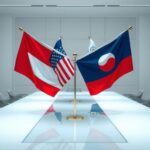The Dilemma of American Leadership amidst Geopolitical Tensions
The article discusses the strategic hesitation of the United States amidst China’s assertiveness. Key points include potential reductions in U.S. military support to allies, shifts in foreign policy under political pressures, and implications for international alliances. The overall picture presents concerns about American influence and leadership in the face of rising powers like China and Russia.
As geopolitical dynamics evolve, the United States finds itself in a state of strategic hesitation, which poses a risk to its global authority. In contrast, China is methodically asserting its influence with a clear vision and long-term objectives. Recent developments indicate that the Pentagon is contemplating a reduction in military expansion plans in Japan at a critical moment amidst rising tensions with Beijing, raising concerns about Washington’s commitment to its allies.
This uncertainty is not confined to East Asia; it permeates Europe as well. The aftermath of the Russian-Ukrainian conflict has emphasized the importance of U.S. military and financial support for Kyiv, yet fluctuating political sentiment in Washington threatens to undermine this support, creating an unstable environment for Ukraine that may favor Moscow.
Former President Donald Trump has recently urged Ukrainian President Volodymyr Zelensky to consider negotiations with Russia, indicating a shift in U.S. policy that may endanger the essential support that Ukraine has relied upon. Trump’s critique of unconditional American assistance sends alarms to Kyiv, which now faces an existential crisis rooted in its heavy reliance on U.S. support, while Russia could perceive this change as a strategic advancement.
Russia’s strategic interests extend beyond Ukraine, as it recognizes American hesitance as a potential opportunity to reshape alliances within Europe. A diminished U.S. commitment may encourage Russia to reassert dominance over former Soviet regions, with Putin anticipating that weakened support for Ukraine might lead to vulnerabilities for Eastern European nations dependent on U.S. deterrence.
For China, U.S. indecisiveness presents an opening to bolster its influence. In the Indo-Pacific—a critical theater for U.S.-China rivalry—Chinese military operations are increasing, especially in the South China Sea and near disputed territories. As Washington considers reducing its military presence in Japan, China actively enhances its naval and aerial capabilities, thereby showcasing its strength to regional partners and U.S. allies.
The diverging approaches of China and the United States highlight strategic consistency versus tactical uncertainty. While Beijing pursues a long-term strategy to extend its influence through targeted initiatives, Washington appears conflicted between upholding its legacy as a global leader and responding to rising domestic calls for withdrawal from foreign engagements.
The ramifications of continued U.S. hesitation could be severe, potentially altering perceptions among allies like Japan, Taiwan, and Ukraine regarding the reliability of American support. If such allies begin viewing U.S. backing as unpredictable, they may explore alternative security partnerships or enhance their military capabilities, leading to a significant shift in the global order where China could emerge dominant in Asia and the United States slowly forfeits its influence.
This shift may also reverberate across other regions, such as the Middle East and Latin America, where nations are already reassessing their foreign policies and strengthening ties with China and Russia. Notably, countries like Saudi Arabia and the UAE are diversifying their alliances through closer economic and military cooperation with these powers, signifying the challenges posed to U.S. leadership in global affairs.
The pressing question is whether Washington will persist in its uncertain strategic course or recognize the implications of disengagement and revise its approach to counter the escalating challenges from China and Russia. The current trajectory suggests a diminishing phase of American dominance unless comprehensive measures are implemented to reinforce its role in global leadership.
In summary, the growing hesitance of the United States to assert itself globally is giving China the opportunity to expand its influence, while Russia stands ready to exploit any perceived weaknesses in American commitment. The potential fallout could result in significant shifts in international alliances, with key U.S. partners reassessing their security posture in light of uncertain support. The overarching challenge for Washington lies in recognizing the urgent need to recalibrate its strategy in response to the evolving geopolitical landscape, lest it find itself increasingly sidelined in global affairs.
Original Source: www.dailynewsegypt.com








Post Comment